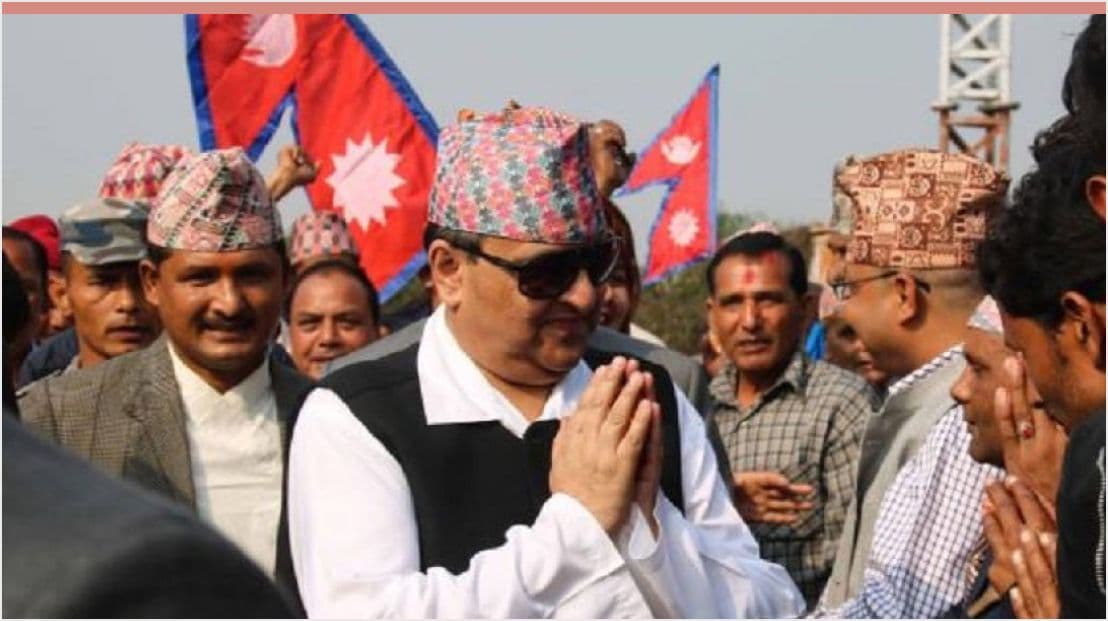
Those that are most slow in making a promise are the most faithful in the performance of it”.
-Jean-Jacques Rousseau.
______________________________
N. P. Upadhyaya (Aryal)
Biratnagar: It was definitely a wonderful afternoon- gathering which saw the attendance of a galaxy of acclaimed intellectuals that included, veteran diplomats, senior legal eagles ( some practicing even), former Nepal Rastra Bank Governor, old-timer senior Nepali Congress leader, some former security officials and a few noted journalists.
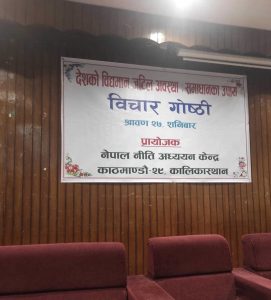
The celebrities mentioned above had assembled to listen to a half-day long conversation organized by the “Nepal Policy Study Center”, August 12, 2023, in Kathmandu.
The Policy center, we have been told, has been formed former recently to discuss and debate the Himalayan issues that have been confronting the nation over these decades.
More or less the country, once a sovereign and independent country is, many would agree, is dipped into acts of high level corrupt practices that include human Trafficking, gold smuggling in tons and tons and in addition, submitting the national sovereignty to the powerful country in the South.
Interestingly, the perpetrators of the acts of high corruption were all the men trusted and tested men of the Indian regime more so the inner coterie men of the one Indian Foreign Secretary, Shyam Saran, who not only damaged the country but was clever enough to depute his “funded men” to rule Nepal sans Monarchy.
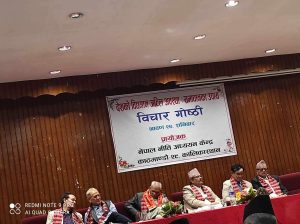
Some even say that the Republican Order in Nepal now in force, is the brain child of this ugly and dirty Indian Foreign Secretary Mr. Saran who under the express instructions of the Italian Queen, Mrs. Sonia Gandhi, broke Nepal into pieces whose reflection is today’s fractured and intensely polarized Nepal.
So in many more ways than one the present day Republican Order could be taken as the imposed gift of FATHER Shyam Saran which is hanging on the neck of the innocent Nepali population as an “albatross”.
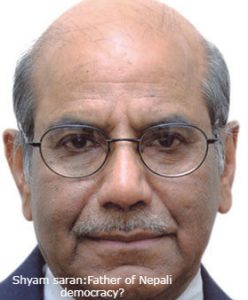
Back to the august gathering:
The exchange of ideas centered on how to get the country out from the current political flux so that the already worn out and the perturbed Nepali population since the very calculated expulsion of the Nepali monarchy could feel that they were in the safe hands and that the country once again restored its lost glory.
The scholastic convergence tentatively agreed that the country’s political and economic shape was in ruins and that it needs someone very special who could get out the country from the current political and economic crisis?
However, none among the brilliant gathering could point out the man who was suitable enough at the moment to award the much needed relief to the politics-plagued country?
But! Yes someone from the political sector did try to offer such a name but that too in an indirect manner?
We will come to that benevolent special man later.
The fact is that after the dismissal of the Nepali Monarchy the country is reeling under the shackles of the Nepali leaders who apparently were indoctrinated by the aliens more so by the Southern neighbor and had centered their collective rule on how to loot and exploit the nation for their personal benefits.
In a way, the country has become custodian less which is why the politics has already derailed from its original track visibly.
In addition, super power rivalry, for example, in between the US, China and India, and their intense antagonism in Kathmandu’s fluid politics and their one point objective being on how to influence the political course of the “non-aligned” Nepal in their country’s favor, is the root cause of the entire evils that has plagued the nation since a decade or so.
In the process, some veteran diplomats openly claim that Nepal no longer remains a “non-aligned country” and by the same token it can in no way claim as to have been a “first day” founder of the Non Aligned Movement that took its birth in Bandung, Indonesia, and Nepal august King Mahendra was one of the distinguished participant of the Bandung conference.
For the record, the first large-scale Asian–African or Afro–Asian Conference —also known as the Bandung Conference—was a meeting of Asian and African states, most of which were newly independent, which took place on 18–24 April 1955 in Bandung, West Java, Indonesia.
The conference was attended, as per the Wikipedia, by 29 Asian and African countries besides the five countries mentioned above, namely, Afghanistan, Cambodia, China, Egypt, Ethiopia, the Gold Coast (Ghana), Iran, Iraq, Japan, Jordan, Laos, Lebanon, Liberia, Libya, Nepal, the Philippines, Saudi Arabia, Sudan, Syria, Thailand, Turkey, the Vietnam Democratic Republic, South Vietnam (later reunified with the Democratic Republic of Vietnam) and Yemen (Republic of Yemen).
Back to the point.
The three power contest petition could already be seen and felt in Kathmandu’s politics and that has unfortunately polarized even the academic personalities.
It is this process, that is the intense political rivalry in between the three big powers ( US, China and India) has made the former sovereign and independent country hopeless and the national population is feeling the negative impact of the aforementioned competition.
Three pronged political thrust has been apparently further derailed the national politics.
The first ever triangular push and pull is a non-stop affair at the moment.
The highly academic panelists seated at the podium yet offered their sane proposals in their modest way.
Some participants undoubtedly offered solutions to the continued national disarray.
However, what was strikingly common in their avowal was that they all converged in saying that the “country was being ruled by fraudulent-political criminals a la monster and that the realm ought to remain free from the forced bondage of the looters, exploiters, political immorals and some even hinted that the country must get out from the clutches of the “traitors”.
In a way, politics has been criminalized and that these political criminals of sorts must be rejected out rightly, sooner the better.
Initiating the discussion, the former Nepal’s Central Bank Governor Dr. Tilak Rawal admitted that the country is being ruled by a political mafia in cycle.
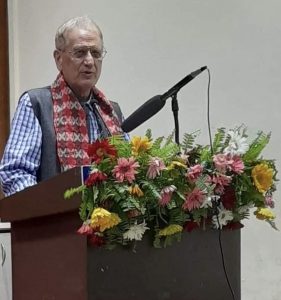
Dr. Rawal is a senior Nepali economist in his own right. He knows the state of the Nepali economy better than anyone else.
“A few men rule the nation cruelly in cyclic order. And the cycle goes on and on which apparently has no end”, Dr. Rawal continued.
As a senior economist, Dr. Rawal painted a very gloomy picture of the national economy which, as per Rawal, is near to collapse.
“The nation state is reeling under the commands/dictates of some four political leaders who rule the nation in rotation and that it is this dishonorable set of the political privileged ones who have criminalized the national politics after the introduction of the imposed Republican order”, opined Dr. Tilak Rawal.
Dr. Rawal, as a reference, cited the example on how to fight with poverty and provide economic relief to its poverty stricken population.
Dr. Rawal without chopping-up words bluntly said that “politics has become an effectual tool to accumulate wealth through corrupt practices.”
“We have no items to export which compels us to rely on imports only from India or for that matter China”.
Nepal’s trade balance with both the neighboring countries are not even thus the country is in debt up to the brim.
Dr. Rawal also said some notorious political brains in implicit partnership with alien forces managed the designed expulsion of the sitting King which is why the country is in a political/social and economic hodgepodge.
Can a monarch be expelled? The one whose ancestors who have had founded the country can be driven? Can they be even thought that they have been absent from the realm?
But, yes the monarch willingly quit the throne sensing the mood of the people at that particular time?
He just voluntarily remained out from the political scene then hoping that the new political leadership shall be able to cater to the increasing needs of the disgruntled population.
That’s it. The King is very much in the country, however, his rule is what is absent from our vision, Dr. Rawal hinted.
By implication he sounded that the Monarchy has to be restored in order to save the country from the continued assault of the political leaders.
The king is needed more so to correct the drift seen in Nepal’s long adhered non aligned policy enunciated by the founder King Prithvi Narayan Shah-the great.
The most vocal speaker that afternoon in the said program was a prominent senior advocate Shri Dhruba Lal Shrestha who gave a detailed account on how on a regular basis the Nepal-India international border pillars are being pushed deep inside Nepal and yet the ruling political elites possess no guts even to send a note of resentment to the Southern neighbor-India?
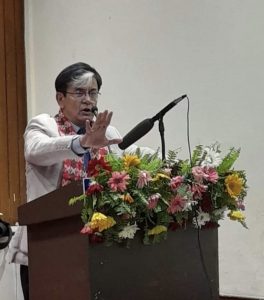
The senior advocate said that the ruling elites appear frightened to talk even with the Indian leadership face to face on the shrinking border issue.
Advocate Shrestha recalling the Mahakali River Ratification Treaty of the mid-nineties said that in effect Mahakali River was sold out to India at a dirt cheap price and thus it was a calculated treason against mother Nepal.
The compliant acts of the present day leaders forces one to question whether our leaders were slaves of the neighboring country? Isn’t it sufficient pro prove my statement?
As a personality engaged in the legal domain over decades and decades, Mr. Shrestha opined that the country’s Apex Court too appears to be in continued disarray which has thus hit the independence of the Judiciary even.
The Nepali judiciary is the one the hardest hit after the much publicized last political change.
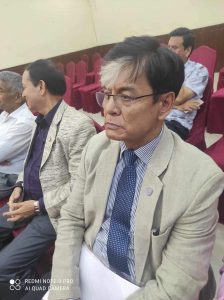
“It is really inopportune”, claimed advocate Mr. Shrestha.
Later Bipin Koirala, a towering senior Nepali Congress leader making an acerbic account on the decline of the country’s political/social, economic stamina since the political change of 2005-6 said that “it is not the Singhdurbar” that has approached down to the villages across the country but instead it is the “corruption” that found its passage down to the village echelon.
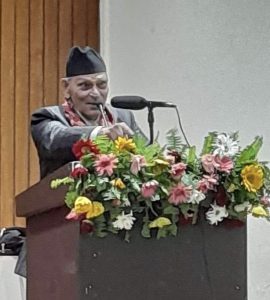
The one and the only one remaining seasoned Nepali Congress leader said in no uncertain terms that the country’s present weaknesses could only be sorted out for the better if and when we scrap the constitution now in force summarily.
” The 1990 Constitution must substitute the present constitution in order to bring back the country to its original political track”, so said Nepali Congress veteran Mr. Koirala.
Bipin Koirala hails from Sindhuli district and is considered to be a man of high integrity and liberty.
The senior Congress heavyweight Koirala appeared sure that only the 1990 Constitution can restore peace and stability in the country for all time to come.
He appealed all the attending guests to take a stand on the restoration of the 1990 Constitution which then was taken as one of the best national document in the entire South Asian landmass.
In other words, Koirala said that the present constitution needs to be scrapped, earlier the better.
Mr. Koirala’s million dollar advice to the attending participants and through them to the nation was that “the Nepali monarchy must be reinstated at least for the benefit of the coming generations”.
And yet another important suggestion from Bipin Koirala was that the country now urgently needs a benevolent-democratic dictator.
He however, did not elaborate on such a benevolent-democratic dictator for some mysterious political reasons.
But yet Koirala’s hint was for sure the restoration of the dismissed monarchy.
“We need to bring back the monarchy for a variety of political considerations”, forcefully added the senior Congress leader.
From the Chair Pyar Jung Thapa-the former Nepal Army Chief reiterated that for the development of the nation, peace and stability was a must.
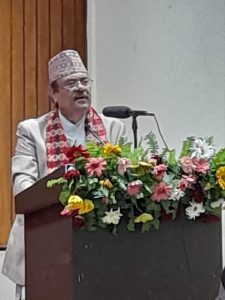
During the course of his short speech, the former Army Chief Thapa and concurrently who is the President of the “Policy and Studies Center” lauded the immense contributions of late King Mahendra rendered for the development of the nation.
“During late King Mahendra’s tule, Nepal’s international prestige and popularity had taken an unprecedented height”, opined the former Nepal Army Chief Thapa.
“A prosperous Nepal is our ultimate goal”, concluded Mr. Thapa.
Prior to winding up his brief speech, the former Army chief Mr. Thapa narrated a small chat that he have had with the then sitting Monarch-King Gyanendra.
– We have tried to make the meet in between King Gyanendra and Army Chief at that particular highly charged moment that may have transpired in between the two in that very highly charged political moment that certainly it was. Just we have tried to make it close to real.We apologize to have dared to speculate the possible conversation in between King Gyanendra and Chief of the Army Staff-N. P. Upadhyaya.
Army Chief Thapa Says that, “ The popular movement of the year 2005-6 was at it peak….the King then asked his military chief as to whether the wave of the movement could be subsided or say controlled?
The army Chief Thapa replies, in his own words, “Yes! Your Majesty….We can definitely control the movement…however, what however? Asked the King Mr. Thapa to speak his internal thoughts?
The Army Chief Thapa then politely submitted to HM the King that, (in his own words) “ I beg your pardon Your majesty, it would cause immense human casualties Your Majesty!”
Listening to what the Army Chief said and pondering over his saying, a visibly pained and disturbed His majesty the King Gyanendra instantly took a determined decision of quitting the throne…Ok…then I go by the people’s choice and political preference and relinquish the crown… I do not want to rule the country over dead bodies…my own Nepali nationals…. The sons and daughters of mother soil…
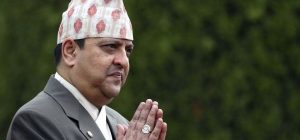
And later a smiling King left the Narayan Hiti Royal Palace with his consort Queen Komal as an ordinary personality and entered to the Nagarjun jungles…
( My own feelings too have been added to present the event in a lucid m,anner that I myself witnessed unfortunately.
What was more than satisfying is that the bloodshed was averted…. A rare historical document… indeed.
Interestingly, soon a couple of minutes later the same day May 08, 2008, the then Danish Ambassador to the Nepali court FinnThilsted told me at the Russian Cultural Center that “ it was an unbelievable political phenomenon Mr. Upadhyaya!
I have, continued the Danish envoy Finn Thilsted saying that, “never heard in the history that a sitting monarch is willingly abandoning is centuries old held Crown…No bloodshed…it was simply incredible and first ever event in the entire history….now I have immense love and honor for your deposed King Mr. Upadhyaya…
The Danis envoy and I had met each other ar the Russian Center to the inaugural of the Sri Lankan festival in Kathmandu.
The Sri Lankan Ambassador Sumith Nakandala’…was later briefed by us both on how the King said good bye to the Palace-the seat of the Nepali Kings.
Welcoming the attending participants, the Vice President of the “Nepal Policy and Study Center” Ambassador Ram Bhakta Thakur said that the country’s political health is not in a good shape and that the country has already lost the ‘power balance’ which is really unfortunate.
Ambassador was in pains to see his country submerged in both a political and economic mess which have had a direct impact on the living standard of the people.
He meant to say, as much as I could understand, that Nepal has drifted from the long adhered policy of Non Alignment which was too bad for the country.
The country’s non-aligned policy appears to have lost its relevance which is too dangerous, lamented Ambassador Thakur.
In sum, Ambassador Thakur lamented the political and economic health of the country.
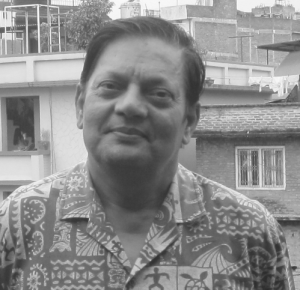
Dr. Thakur hinted that the big power brawl in Nepal has in effect visibly put a severe stress on Nepal’s long practiced non-aligned Policy.
“We need political stability for peace and development”, Dr. Thakur concluded.
The discussion organized by the Nepal Policy Study Center went well.
That’s all.
@telegraphnepal


